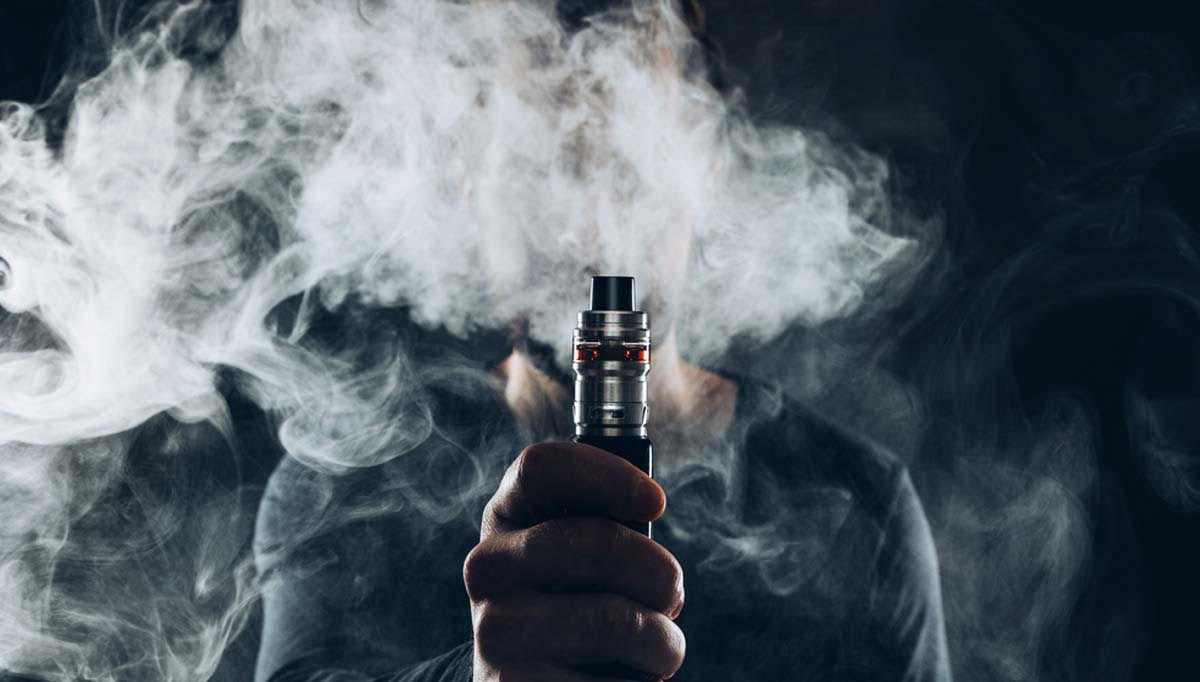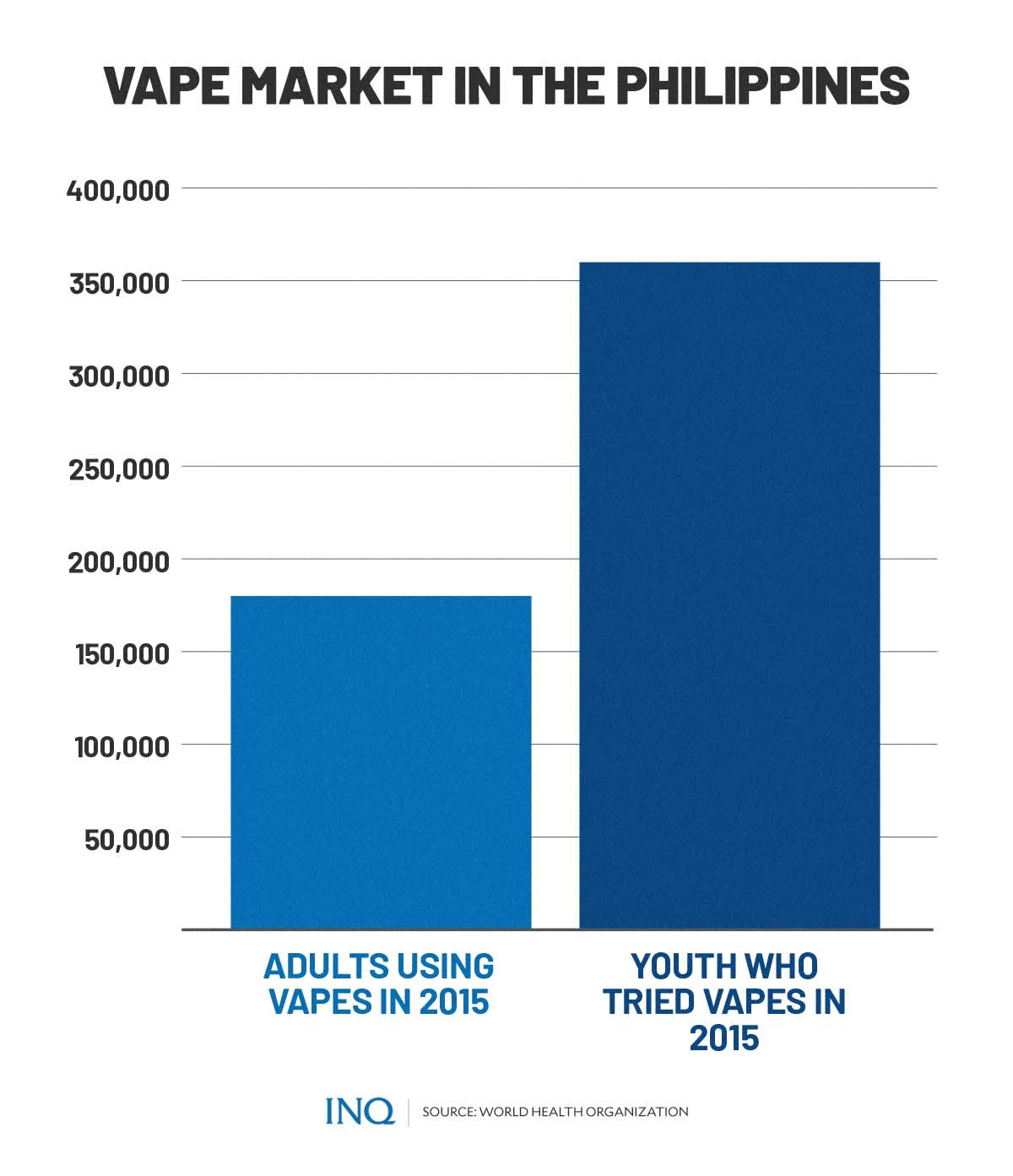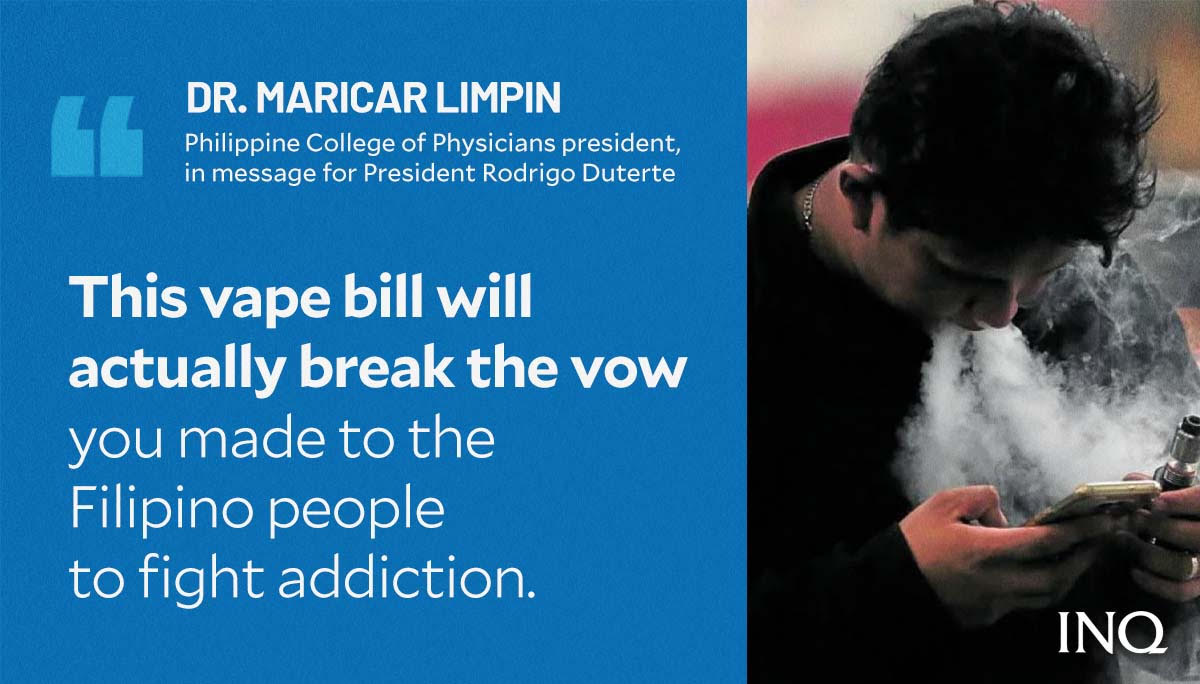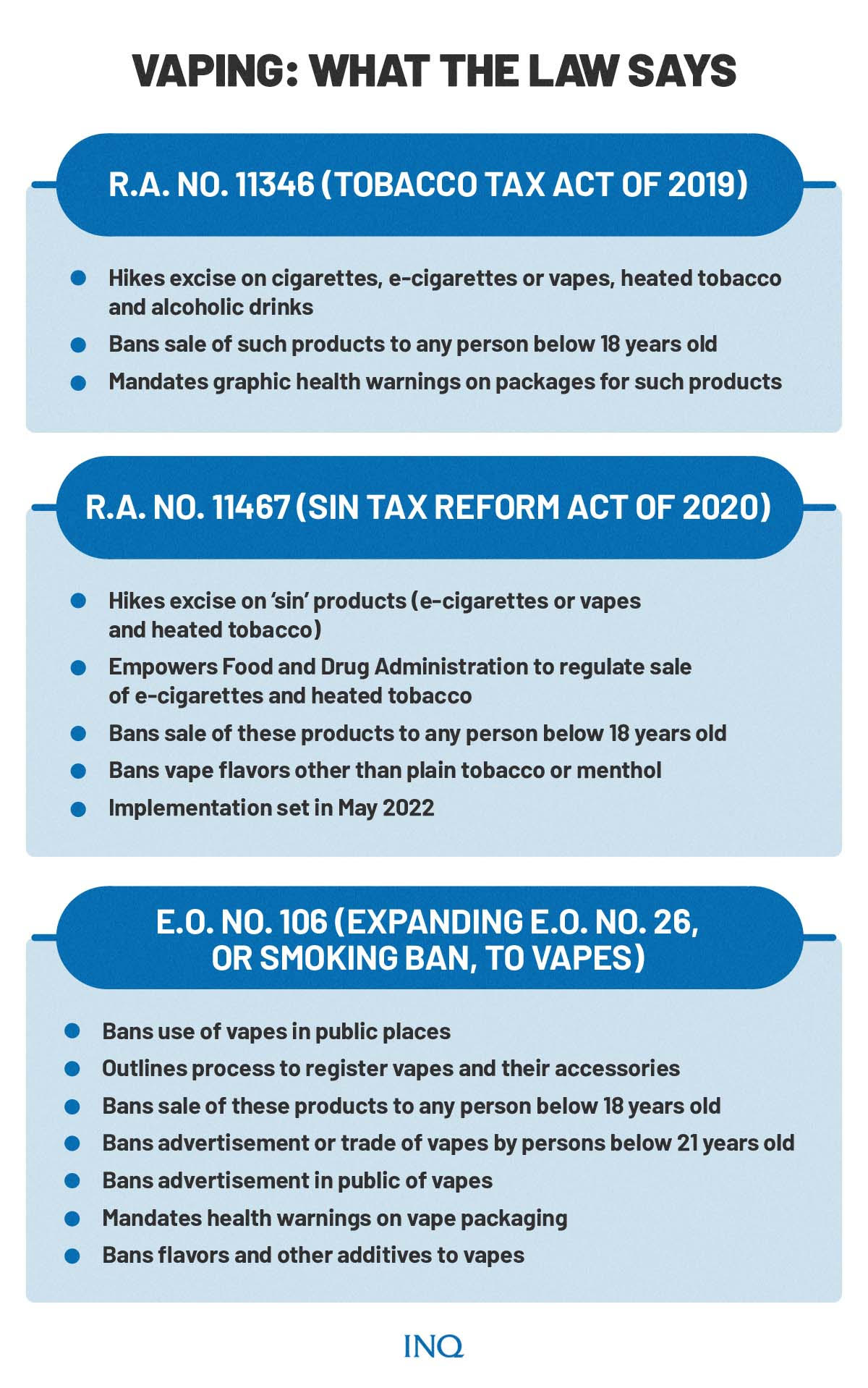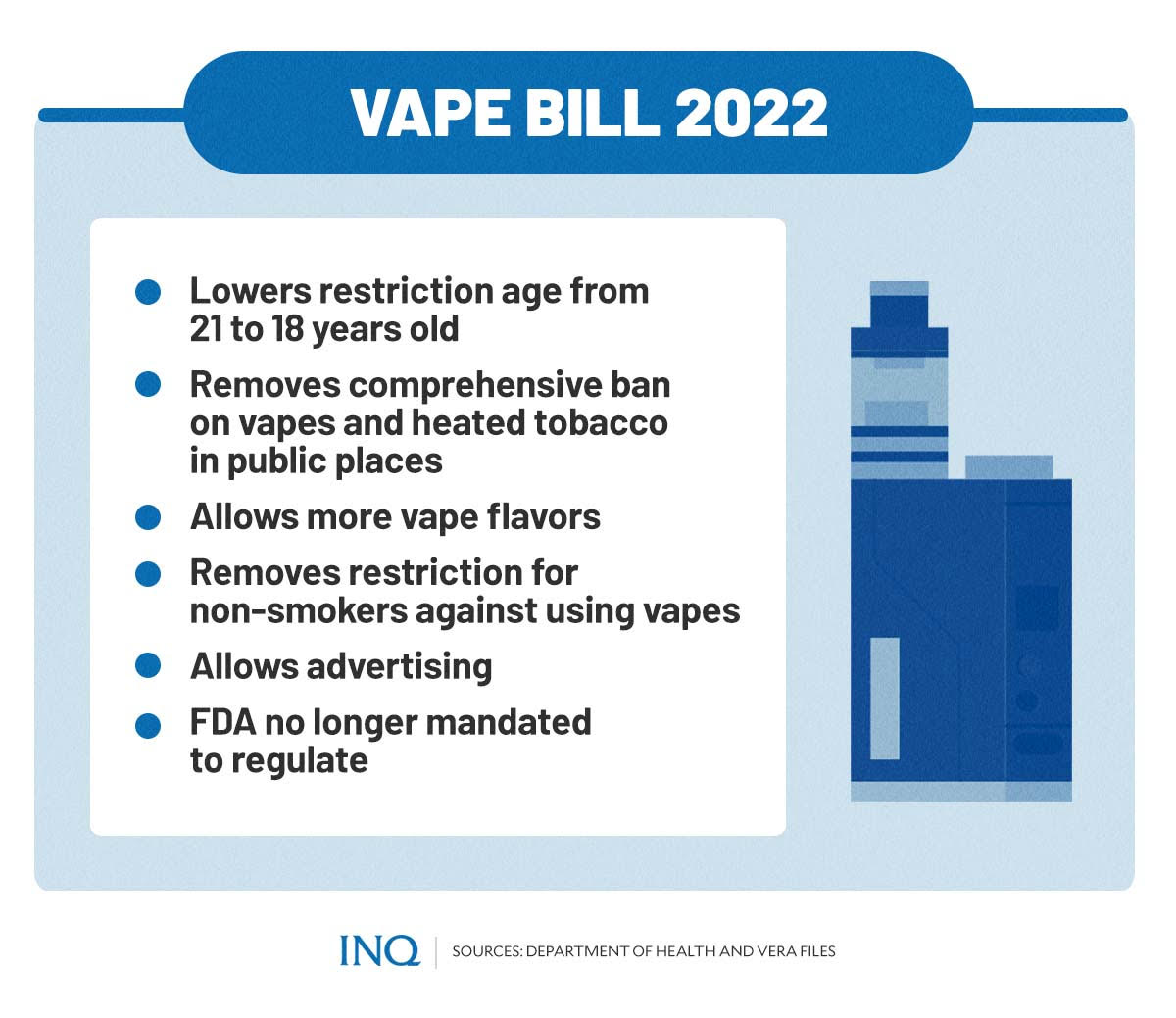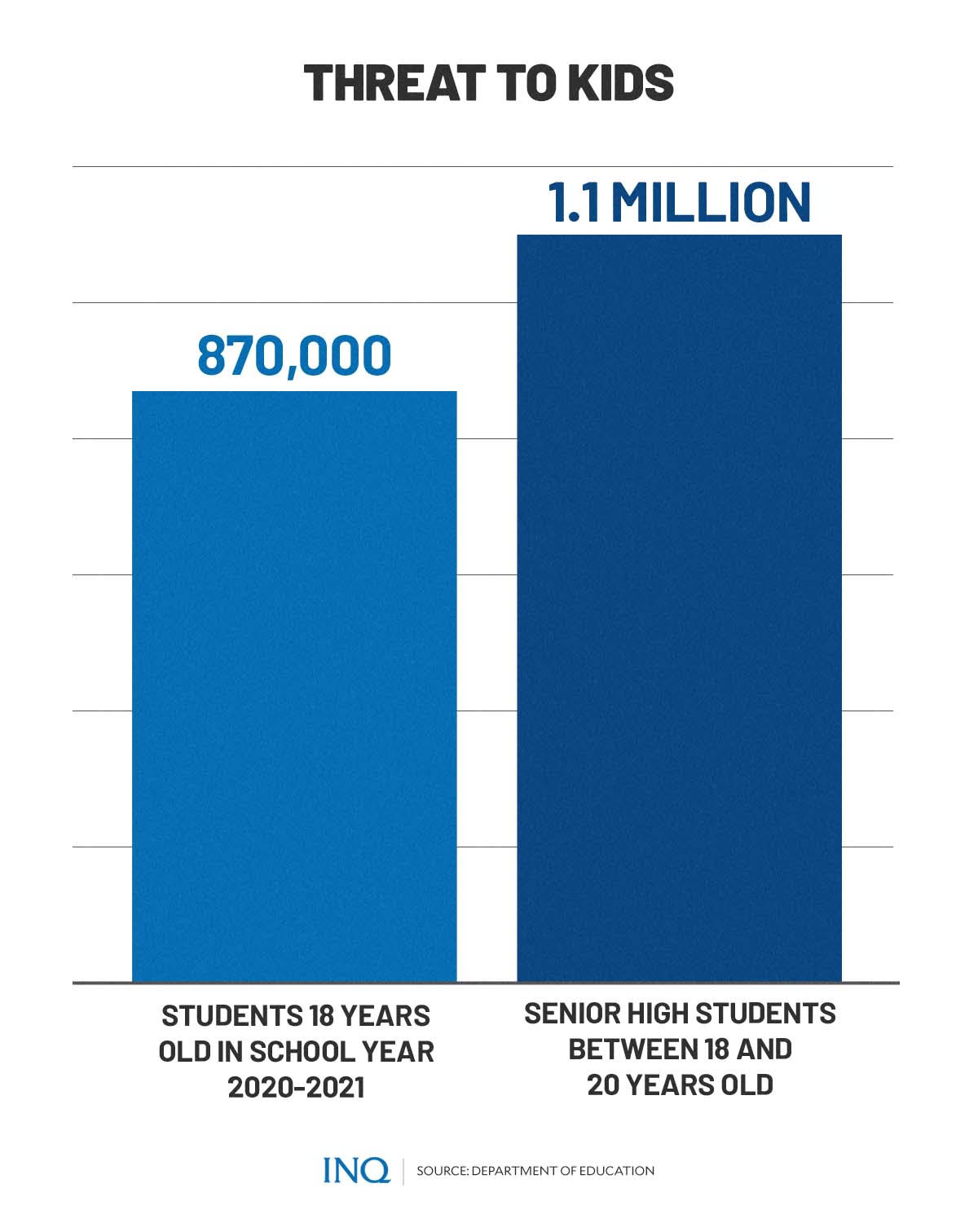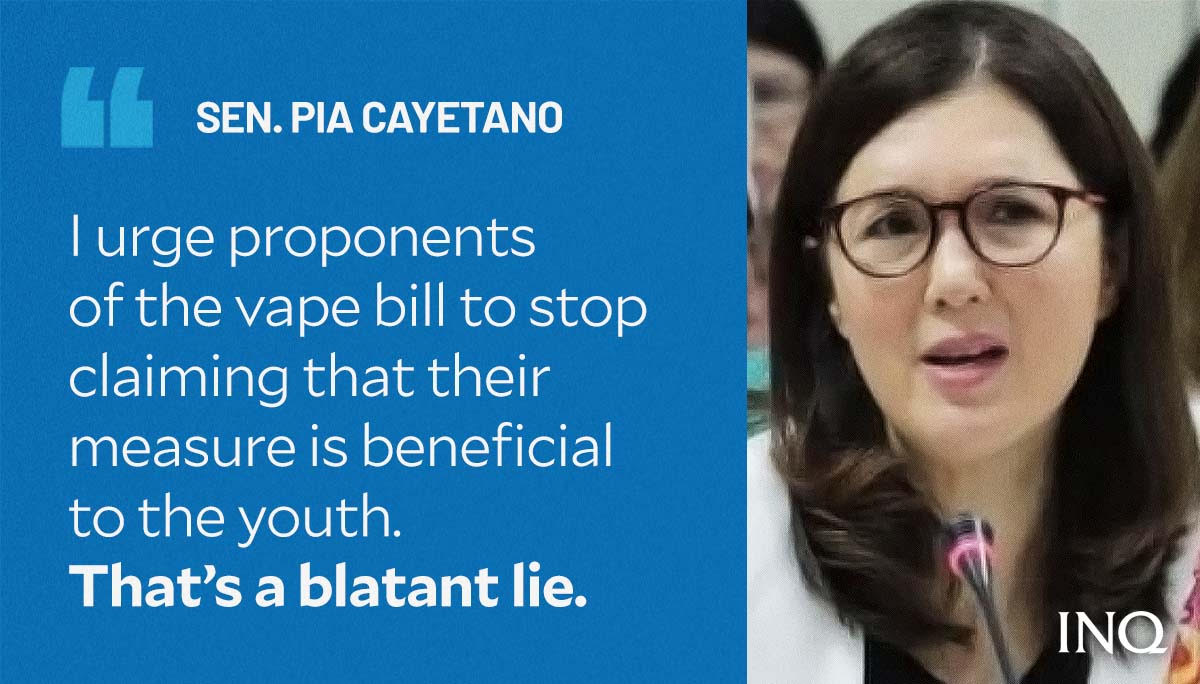As Duterte action awaited on Vape Bill, experts paint grim scenario for PH youth
(First of two parts)
MANILA, Philippines—Months after the proposed Vaporized Nicotine Products Regulation Act, or the Vape Bill, was passed in both the House of Representatives and the Senate, the bill remains hotly debated—more so as groups await President Rodrigo Duterte’s decision on whether to veto or sign it.
Last year, the Senate approved Senate Bill No 2239, while the House of Representatives approved its counterpart version House Bill No 9007—both of which seek to regulate the importation, manufacture, sale, packaging, distribution, use, and advertisement of vaporized nicotine and non-nicotine products.
READ: Vape bill gets final Senate nod
The two bills were reconciled by a bicameral conference committee.
On Jan. 25 this year, the Senate ratified the report of the bicameral conference committee, which reconciled the disagreeing provisions of Senate Bill No. 2239 and House Bill No. 9007.
Article continues after this advertisement“This bill is meant to regulate vaporized nicotine products, non-nicotine products, and novel tobacco products. It is expected to encourage a shift from smoking the unhealthier cigarettes to these alternative less harmful products,” Senate President Pro Tempore Ralph Recto explained.
Article continues after this advertisementThe bill also stated that the said products are not allowed to be sold to minors.
“This bill is never intended to adopt a new lifestyle, especially for minors, who are prohibited from having access to these products,” Recto added.
Any post, message, or image by manufacturers, importers, distributors, and retailers meant to encourage the purchase or use of vape products would also be prohibited under the law.
READ: Senate ratifies bicam report on vape bill
While the public waits for Duterte’s decision, groups on both sides of the camp on the proposed law have been urging the President to push for or veto the bill, citing the advantages and disadvantages of the use of vape products.
Veto vape bill
The Department of Education and Department of Health, along with medical groups and civil society groups, have repeatedly appealed to Duterte to veto the pending “anti-health” vape bill.
“Mr. President we appeal to you to veto the vape bill. It is a deregulation of e-cigarettes and heated tobacco product,” said Dr. Maricar Limpin, president of the Philippine College of Physicians (PCP), at an online press briefing earlier this year.
“This vape bill will actually break the vow you made to Filipino people to fight addiction. What will happen is it will increase addiction to cigarettes and alcohol and illicit drugs,” Limpin went on.
READ: Medical groups ask Duterte anew to veto vape bill
In a statement released in December last year, the health department said that vape products are “harmful and not risk-free”, as claimed by some who support the pending bill, and “should be regulated as health products due to their toxic substances and effects.”
Aside from the harmful impacts of vape products on a person’s health, one of the most cited reasons behind calls to veto the vape bill were provisions which the DepEd, DOH and private groups said would weaken already existing laws on vape products.
The health department also noted that the bill, which seeks to expand access to vape products, puts more Filipino youth at risk.
Eases restrictions
“The bill is retrogressive and contains several provisions that contradict public health goals and international standards. It also undermines the country’s progress in tobacco and control,” the DOH said.
“As a government institution championing young Filipinos’ well-being, we are taking a stand against the so-called ‘anti-health’ vape bill, which will weaken existing law and the executive order against Electronic Nicotine Delivery Systems (ENDS) or Electronic Non-Nicotine Delivery Systems (ENNDS) commonly known as e-cigarettes or ‘vapes,’” DepEd said in a statement.
In January 2020, Duterte signed Republic Act 11467—or the Sin Tax Reform Act of 2020—which seeks to increase excise on alcohol products, electronic cigarettes (e-cigarettes) or vapor products, and heated tobacco products (HTPs).
Under RA 11467, such products are regulated by the country’s Food and Drug Administration (FDA).
The measure, which is expected to be fully implemented this May, also prohibits the sale, purchase, and use of e-cigarettes or vapor products and HTPs to any person aged 21 years old and below and to non-smokers.
It likewise limits flavors of e-cigarettes or vapor products to only plain tobacco or plain menthol.
A month later, in an effort “to protect Filipinos, especially the youth, from the harms associated with the use of and exposure to smoke and emissions from tobacco products, vapor products, and HTPs,” the President issued Executive Order No. 106.
The EO prohibits smoking or vaping in a comprehensive list of public places and selling or distributing tobacco products, e-cigarettes or vapor products near schools, public playgrounds, youth hostels, recreational facilities, or areas frequented by persons below 21 years old.
It also prohibits “incorporating e-liquids, solutions, and refills with flavors and additives that are proven or suspected to be appealing or enticing to persons below 21 years of age.”
The list of prohibited acts under both measures, which aim to prevent the use of e-cigarettes or vapor products and HTPs among minors or persons below 21 years old, goes on.
On the other hand, however, the proposed vape bill awaiting Duterte’s action lowers the age of access to vapor products from 21—as currently stated by RA 11467 and EO 106—to 18 years old.
Compared to the existing laws, which disallows the use of flavors and additives that can entice or appeal to minors—such as cotton candy or fruity flavors—and allows only plain tobacco and plain menthol flavors to be sold in the country, the pending bill also only restricts those with “flavor descriptors” that are “proven to unduly appeal” to youth.
While some experts said flavors might not have a direct impact on health, they will entice more non-smokers, particularly the youth, to use e-cigarettes or vapor products and HTPs—which, in the long run, might turn into a dangerous lifelong addiction.
“The flavors, that’s why we don’t want them, it’s not because of the injury, it’s because it entices children, it was developed for kids. Because no adult will smoke blueberry flavor or ice cream,” Dr. Rolando Enrique “Eric” Domingo, former director-general of the Food and Drug Administration (FDA), told VERA Files.
Moreover, Limpin said flavors tend to “mask the irritating” effects of vapor products or vape.
“By lowering the age of access to vapor products from 21 to 18 years old, allowing flavorings, and permitting advertising and sponsorship strategies, the bill, when passed into law, will expose our youth to harmful and addictive substances by making vapor products enticing and easily accessible,” the DOH stressed.
READ: DOH: Vaping puts young Filipinos at risk
“We teach in schools how the part of the brain that is responsible for rational decisions does not fully develop until one is in their mid-twenties. Before that age, young people are very vulnerable to engaging in risky behaviors such as substance use and abuse,” DepEd said.
“If there will be any attempt to amend existing laws, it should be to increase the age of access to harmful products, not lower it,” the department added.
READ: DepEd urges Duterte to veto vape bill
The proposed vape bill, as pointed out by experts, also allows advertisements of novel smoking products such as e-cigarettes or vapes and HTPs through direct marketing and on the internet.
“Given that advertising and promotions entice the initiation and use especially among the youth and given that the top reason for vape use is online accessibility, the DOH and FDA strongly recommend to prohibit these provisions and to prohibit flavorings other than plain menthol and plan tobacco, consistent with RA No 11467, and to further provide comprehensive, more stringent regulation in advertising, promotion, sponsorship or vapor products,” Health Secretary Francisco Duque III said in a memorandum to the President.
Stop spewing ‘blatant lies’
In a statement last March 4, Sen. Pia Cayetano, who sponsored RA 11467, likewise urged the proponent of the pending bill to refrain from claiming that the measure will be beneficial to the youth—which the senator described as a “blatant lie.”
“The proponents say that their bill [solidifies] the provisions of RA 11467 and Executive Order 106″ by strengthening the flavor ban on e-cigarettes. If that was the case, then they should have just kept the provision of the Sin Tax Act – which limits vape flavors to plain tobacco and plain menthol only,” the senator said.
“Instead, they provided wording that allows hundreds and thousands of flavors to flood the market. How will they even regulate all these flavors? In the US, 55,000 flavors were rejected by the US FDA for failing to provide evidence that they protect public health,” she added.
Cayetano also pointed out that the vape bill will remove the country’s FDA as the regulatory body for e-cigarette products and flavors.
Echoing calls by DepEd, DOH, and other groups opposing the bill, the senator said the youth will be better protected if access to “harmful” e-cigarettes or vapor products and HTPs at 21 years old will be retained.
“The Sin Tax Reform Act of 2020 placed this at 21 years old, but the Vape Bill lowered it to 18 years old, so now even senior high school students can buy and use vapes,” Cayetano said.
“So where’s the ‘protection’ for the youth that the Vape Bill proponents claim?”
PH statistics
According to the General Adult Tobacco Survey (GATS), in 2015. The overall prevalence of ever users and current users of e-cigarettes in the Philippines was 2.8 percent and 0.8 percent respectively.
During the same year, the World Health Organization (WHO) reported that around 180,000 adults in the Philippines use e-cigarettes and there were at least 360,000 youths who reported having ever tried e-cigarettes.
As years pass by, more youths continue to use e-cigarettes and vapor products.
A study conducted by the Philippine Pediatric Society showed that 11 percent of students aged 10 to 15 years old have already tried vapes.
Citing the study, the education department reported that 6.7 percent of Grades 7 to 9 students were found to “have tried and are using e-cigarettes.”
Among the top reasons for vape use among students were online accessibility (32 percent), varied flavors (22 percent), and the belief that e-cigarettes are safer than tobacco (17 percent).
If the pending vape bill is passed into law, the number of youth using e-cigarettes or vape—whether for the first time or not—is seen to increase, according to DepEd, DOH, and experts.
“If the Vape Bill is passed, we should expect more young people to be lured into this harmful vice and eventually lead to fatal addiction to cigarettes,” said Toni Flores, Child Rights Network coordinator.
“There is no safe level of exposure,” Flores added.
According to DepEd data, at least 870,000 learners in the basic education sector for School Year 2020 to 2021 are 18 years old, while close to 1.1 million learners in senior high school are 18 to 20 years old.
“This is the number of learners who will become legally allowed to be marketed the harmful products once the bill becomes law,” DepEd stressed.
“As we continue to implement a comprehensive tobacco control program in schools to safeguard the health of learners, DepEd is hopeful that our leaders and legislators will constantly champion a healthy lifestyle among our youth,” the department said.
